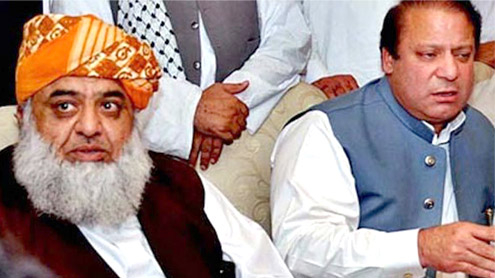
ISLAMABAD: The PML-N and JUI-F may not have reached the power-sharing formula at the centre, but they claim to have worked out a mechanism for holding talks with the Taliban.
Sources in the two parties told Dawn that both sides had decided that the talks with the Taliban would be held through a “grand peace jirga” as suggested by all the mainstream political parties in a “declaration” of the all-party conference (APC) organised by the JUI-F in Islamabad on Feb 28.When contacted, JUI-F spokesman Jan Achakzai quoted party chief Maulana Fazlur Rehman as saying that an agreement had been reached between the two parties on the steps needed to be taken for achieving peace in the country through negotiations with the Taliban.
The JUI-F chief said that soon after coming to power, the PML-N government would prepare a “serious plan” for talks with the Taliban after taking all “stakeholders and policy-making institutions” on board. The government, he said, would then prepare a “roadmap” in the light of the outcome of the consultations.The issue was discussed at a meeting of committees of the two parties currently engaged in dialogue to reach an understanding on a formula for sharing power at the centre.About 30 mainstream political and religious parties had agreed at the APC to negotiate with militant elements through a broadened tribal jirga that had earlier been formed by the JUI-F. All members of the grand jirga were present at the conference.
The APC was hosted by the JUI-F two weeks after a similar gathering organised by the ANP which had also called for holding dialogue with the militant groups, but had not come up with any concrete plan.The Pakistan Tehreek-i-Insaf had boycotted both the events and termed it a futile exercise.The JUI-F spokesman said the PML-N leadership had already endorsed his party’s viewpoint that “indigenous conflict resolution mechanism” should be adopted. He explained that the two sides had agreed that the grand jirga constituted at the APC would be reconstituted and activated for talks with the Taliban.He said the jirga backed by all mainstream parties could not start its work because of the general elections and had to wait till the formation of the new government.
Answering a question, he said the leadership of the two parties had already agreed on the mechanism and the talks at the committee level were being held on other issues, such as Madressah reforms, legislative agenda of the new government, etc.Mr Achakzai said national agenda of the two parties were by and large similar as both of them wanted peace and economic reforms.When asked if the JUI-F wanted to have a written agreement with the PML-N, he said that was desirable, but it was not its demand.A PML-N leader privy to the talks between the two parties endorsed the JUI-F’s version and said the former had told the Maulana that it would stand by its commitment made in the APC joint declaration.
He said Nawaz Sharif had himself attended the APC and they could not even think of backtracking on the commitment made in the joint declaration. He said the PML-N had assured the Maulana that it would fully cooperate with his efforts to bring peace in the country and the region by using his influence and links in the tribal areas.Moreover, he said, the future PML-N government at the centre would also extend its full cooperation to the Khyber Pakhtunkhawa government in its efforts for peace in the province.
The PML-N leader denied reports that his party was negotiating with the JUI-F because of any international pressure. “There is no truth in such reports that we want to take the JUI-F along because the US wants to see it happen,” he said in categorical terms. Actually, he said, the PML-N wanted to seek cooperation of all political parties in and outside parliament in its efforts to steer the country out of crisis.A source in the JUI-F denied any foreign pressure, but admitted that “the line of communication between the Maulana Sahab and the US are open”. The source said any “concrete regional or international consensus” would be taken into account. But, he said, the supreme interest of the nation would override any such consensus if there would be any “conflict of interests”.“There might be some international consensus and the party will definitely keep it in mind. But eventually the national interest will prevail,” he added. – Dawn











